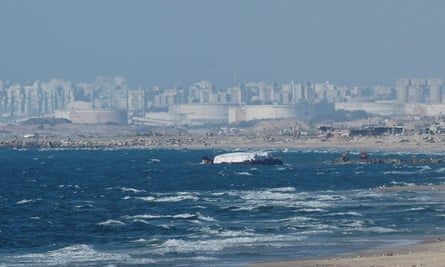Israeli PM’s decision may be intended to put negotiating pressure on Hamas, observers say, after his cabinet discussed truce proposal
Benjamin Netanyahu has approved plans for an attack on Rafah, the southernmost city in Gaza, where more than a million people displaced from elsewhere in the territory have sought shelter, officials in Israel have said.
The decision was made as a ship towing a barge loaded with food arrived off Gaza on Friday. It was a test run for a new aid route by sea from Cyprus into the devastated Palestinian territory, where famine looms after five months of Israel’s military campaign.
Any attack on Rafah is likely to cause civilian casualties and worsen an already acute humanitarian crisis across Gaza.
Germany’s foreign affairs minister, Annalena Baerbock, tweeted: “A large-scale offensive in #Rafah cannot be justified. Over a million refugees have sought protection there and have nowhere to go. A humanitarian truce is needed immediately so that more people don’t die and the hostages are finally released.”
Netanyahu made the decision after a meeting of Israel’s war cabinet to discuss a new proposal from Hamas for a ceasefire.
As a first stage, Hamas has proposed it would release the Israeli women, children, elderly and sick people it is holding hostage in exchange for the release of hundreds of Palestinian prisoners, including some convicted of multiple murders of Israelis.
The militant Islamist organisation seized about 250 Israeli and foreign hostages when it launched an attack into Israel in October, killing about 1,200 people, mostly civilians. About half of the hostages were released during a week-long truce in November; Israel believes about 130 of the captives remain in Gaza and that 32 are dead.
The proposal, which came after talks were stalled for about 10 days, appears to allow for a definitive end to hostilities to be scheduled after, rather than before, a first 40-day ceasefire – a significant concession by Hamas.

Netanyahu’s office described the new demands as “unrealistic” but said an Israeli delegation would leave for Qatar, a key mediator in the negotiations, to discuss Israel’s position on a potential agreement.
Observers said the new announcement about plans to attack Rafah may have been intended to put pressure on Hamas during any talks.
Netanyahu’s office said the Israeli army was preparing “operational issues” and the evacuation of the civilian population from Rafah. No potential timeline was given for the assault. It could take many weeks to prepare the large force needed to take on the several thousand Hamas militants who Israeli officials say are based in the city.
Joe Biden has called an attack on Rafah a “red line” if undertaken without sufficient precautions to protect civilians. Few observers have been convinced by Israeli military officials’ promises to create protected zones to shelter huge numbers of civilians to be evacuated from the city before any assault.
Officials in Israel have repeatedly said destroying any remaining Hamas forces in Rafah is essential to achieving their war aims.
Israel’s military offensive in Gaza has killed at least 31,341 people, most of them women and children, according to the territory’s health ministry.
The UN has warned of famine in Gaza and the growing humanitarian emergency has prompted some countries to diversify aid supply routes, including by air and sea, as land access to Gaza via Jordan, Israel and Egypt remains limited.
On Friday a Spanish ship travelling a new maritime corridor from Cyprus began unloading its cargo of food at a makeshift jetty off the Gaza coast. It is unclear how the aid will be distributed. Fighting is continuing in parts of north and central Gaza, including around the areas where the jetty has been prepared.

